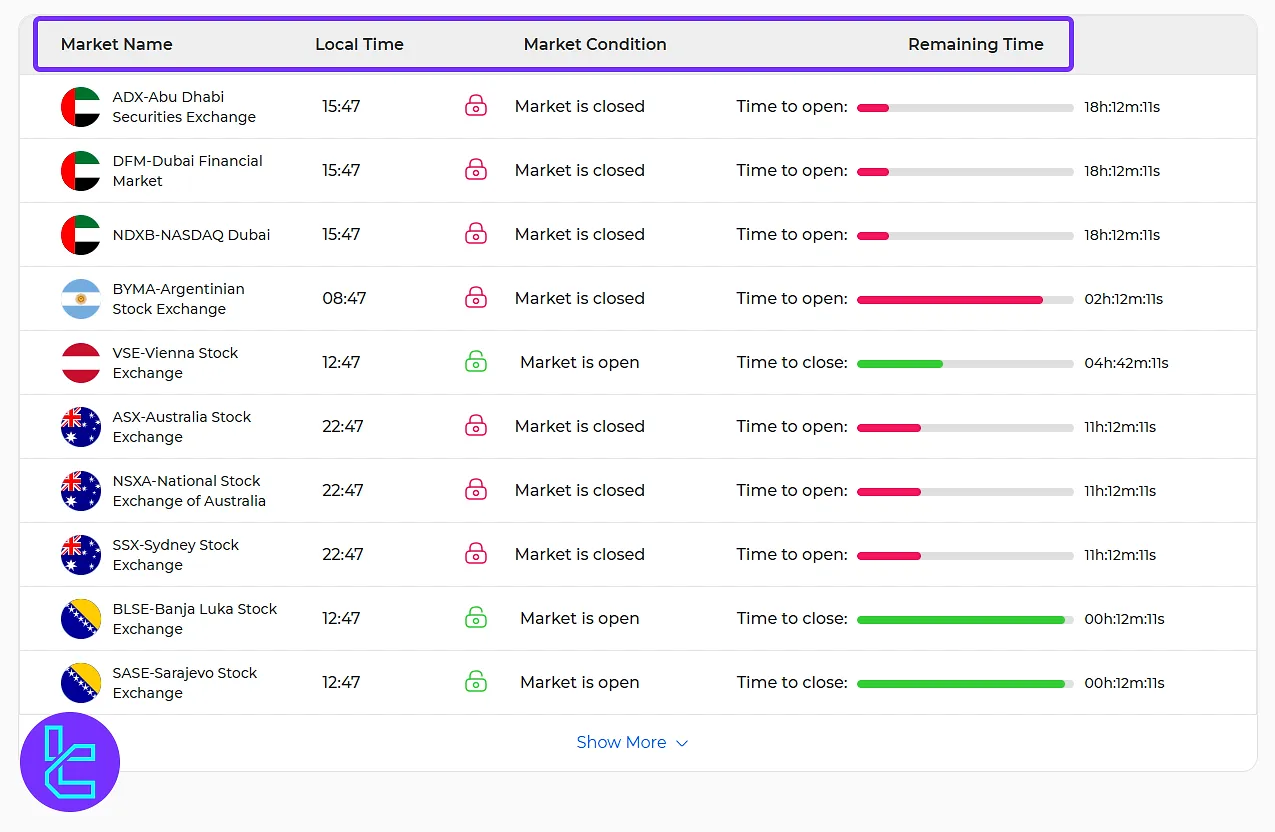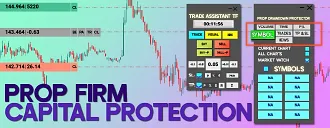Introduction to TradingFinder's Stock Market Session Hours Tool
Users can view the working hours and sessions of financial markets in different regions including Asia, Europe, America, and more in a list format using this tool.
By default, 10 rows are displayed in the table, but with each click on the "Show More" buttbkets will be added to the list.
TradingFinder's Stock Market Session Hours Tool Parameters
The table visible in this free tool consists of 4 columns:
- Market Name: The title of the market along with the name and flag of the relevant country
- Local Time: The current local time associated with the market's time zone
- Market Condition: Indicator of whether the market is open/closed at this moment
- Remaining Time: The time interval until the market opening/closing

Note that all values in this table are displayed live and in real-time.
Importance of Stock Market Hours Worldwide
Unlike forex, stock markets do not operate 24/7 on weekdays and are open at different hours according to time zones. Knowing their working hours is important for the following reasons:
- Timing for executing transactions in the desired market
- Changes in liquidity levels and increase or decrease in volatility
- Risk management and maximizing profit
Trading Hours of Major Global Stock Exchanges
The operating hours of each international stock exchange depend on the time zone of its host country. Below are the trading hours of the world’s major stock exchanges in UTC:
- New York Stock Exchange (NYSE) and NASDAQ in the USA: From 13:30 to 20:00 in winter and 13:00 to 19:30 in summer;
- London Stock Exchange (LSE) in the UK: From 8:00 to 16:30 in winter and 7:00 to 15:30 in summer;
- Frankfurt Stock Exchange (DAX) in Germany: Same schedule as the London Stock Exchange;
- Tokyo Stock Exchange (TSE) in Japan: From 00:00 AM to 6:30 AM, with no daylight saving time adjustments;

- Shanghai Stock Exchange in China: From 00:30 to 7:00 AM, fixed throughout the year;
- Australian Securities Exchange (ASX) in Sydney: From22:00 to 4:30, with no seasonal time changes.
Difference in Stock Market Hours During Summer and Winter (DST)
Daylight Saving Time (DST) is an official time adjustment in some countries designed to make better use of daylight. This change affects the trading hours of stock markets:
- In the United States, DST typically begins on the second Sunday of March and ends on the first Sunday of November;
- In Europe, DST is applied from the last Sunday of March to the last Sunday of October.
Does the Global Stock Market Hours Tool Update Automatically for DST Changes?
Yes; this tool is updated immediately after Daylight Saving Time (DST) changes are applied and accurately reflects the correct hours.
However, since some countries do not observe DST, their market hours remain unchanged in the TradingFinder "Stock Market Hours" tool.
Official Public Holidays of Global Stock Markets
In addition to weekends, some stock markets are closed on specific public holidays, often related to national, religious, or official observances. Below are several notable examples:
Stock Market | Major Holidays |
NASDAQ | Christmas (December 25), Independence Day (July 4), Thanksgiving (last Thursday of November), Labor Day (first Monday of September) |
London Stock Exchange | Boxing Day (December 26), Summer Bank Holiday, Good Friday |
Tokyo Stock Exchange | New Year’s Day, Constitution Memorial Day, Golden Week holidays |
Australian Securities Exchange | Christmas, Boxing Day, Australia Day (January 26) |
Some markets, such as the Tokyo Stock Exchange, remain closed for multiple consecutive days during events like Golden Week.
Final Words
TradingFinder's Stock Market Session Hours tool provides the schedule of 120+ financial markets worldwide in a table with 4 columns: Market Name, Local Time, Market Condition, and Remaining Time to traders. The information in this tool is updated in real-time without delay.













